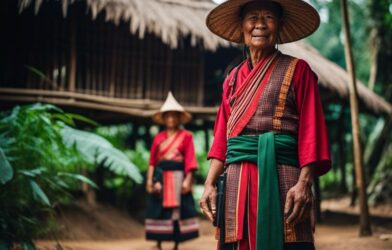There’s a reason why Chiang Mai is a hotspot for travelers seeking authentic Thai culinary experiences. Nestled in the northern region of Thailand, this vibrant city is rich in culture and history, making it the perfect destination to immerse yourself in traditional Thai cooking classes. Whether you’re a seasoned chef or a novice in the kitchen, Chiang Mai offers a variety of options to explore the flavors and techniques of Thai cuisine.
From bustling markets to serene cooking schools, Chiang Mai provides a diverse range of opportunities to learn the art of Thai cooking. Discover the secrets behind aromatic curries, delicate rice dishes, and refreshing salads as you launch on a culinary journey that will tantalize your taste buds and expand your knowledge of Thai gastronomy. So, where can you experience these authentic Thai cooking classes in Chiang Mai? Let’s explore some of the top choices that are sure to satisfy your craving for culture and good food.
Exploring Chiang Mai’s Culinary Heritage
History of Northern Thai cuisine
With a history that dates back centuries, Northern Thai cuisine has evolved from a mix of influences including Burmese, Laotian, and Chinese flavors. This unique culinary heritage can be traced back to the Lanna Kingdom, where food was not only a means of sustenance but also a form of cultural expression.
Traditional Northern Thai dishes are known for their bold flavors, incorporating a variety of herbs and spices to create complex and aromatic dishes. From fiery curries to tangy salads, each dish tells a story of the region’s rich history and diverse influences.
Key ingredients and flavors native to Chiang Mai
For those looking to experience authentic Northern Thai cuisine, it’s important to understand the key ingredients and flavors that are native to Chiang Mai. Some of the staple ingredients include lemongrass, galangal, kaffir lime leaves, and turmeric, which give dishes their distinct aroma and flavor profiles.
Understanding key ingredients and flavors native to Chiang Mai
These ingredients are often used in combination with fresh herbs such as cilantro, mint, and Thai basil to create dishes that are both flavorful and aromatic. Northern Thai cuisine is also known for its use of sticky rice as a staple accompaniment to meals, providing a satisfying texture that complements the bold flavors of the dishes.
Selecting the Right Cooking Class
While planning to experience authentic Thai cooking classes in Chiang Mai, it is crucial to choose the right one that suits your preferences and culinary goals. Selecting the right cooking class can enhance your overall cultural experience and provide valuable skills that you can use in your own kitchen back home.
Factors to consider
- Location and accessibility
- Instructor’s background and expertise
- Class size and level of interaction
- Menu variety and customization options
- Inclusion of market tours or farm visits
The location of the cooking class can significantly impact your overall experience. Ensure that the class is easily accessible and located in a safe area. Additionally, consider the instructor’s background and expertise in Thai cuisine to ensure you are learning from a knowledgeable source. The size of the class and the level of interaction with the instructor are also crucial factors to consider. A smaller class size allows for more personalized attention and a better learning experience. The menu variety and customization options should align with your dietary preferences and interests, while including market tours or farm visits can enhance the cultural immersion aspect of the class. The cost of the class should also be considered, ensuring it fits within your budget while providing value for the experience.
Understanding the different types of cooking classes available
- Group cooking classes
- Private cooking classes
- Specialized classes (vegetarian, street food, dessert)
- Full-day versus half-day classes
- Cooking classes with certification
It is crucial to understand the different types of cooking classes available in Chiang Mai to choose the one that best suits your preferences. Group cooking classes offer a social and interactive environment, allowing you to learn from and engage with other participants. Private cooking classes provide one-on-one attention and customization based on your specific interests and skill level. Specialized classes focusing on vegetarian, street food, or dessert recipes cater to specific culinary interests. Full-day classes provide a comprehensive culinary experience, including multiple dishes and techniques, while half-day classes offer a more condensed session for those with limited time. Some cooking classes in Chiang Mai also offer certification upon completion, which can be beneficial for those looking to enhance their culinary credentials. Any allergies or dietary restrictions should be communicated to the class organizers in advance to ensure a seamless and enjoyable experience.
Top Recommended Cooking Schools in Chiang Mai
Thai Farm Cooking School
With a focus on using fresh ingredients sourced directly from their organic farm, the Thai Farm Cooking School offers an authentic and hands-on cooking experience. Situated in the serene countryside, this school provides a tranquil setting for visitors to immerse themselves in Thai culinary traditions. Led by knowledgeable instructors, students have the opportunity to learn how to prepare classic Thai dishes such as Pad Thai, Tom Yum Goong, and Green Curry.
Basil Cookery School
Schools in Chiang Mai are plentiful, but the Basil Cookery School stands out for its intimate and personalized approach to teaching Thai cuisine. Aiming to not only teach recipes but also share the cultural significance behind each dish, this school provides a well-rounded culinary education. Students can expect to gain insight into the diverse herbs and spices that are imperative in Thai cooking, as well as tips on how to balance flavors to perfection.
The Basil Cookery School offers a variety of courses catering to different skill levels, making it a great option for beginners and experienced cooks alike. Whether you are looking to master the art of crafting a traditional Thai curry or perfecting the art of sticky rice, this school provides a comprehensive and enriching culinary experience.
Market Tours and Ingredient Selection
The role of local markets in Thai cooking
Many cooking classes in Chiang Mai incorporate market tours as part of the authentic Thai cooking experience. These market tours play a crucial role in introducing participants to the vibrant array of fresh ingredients used in Thai cuisine. Participants have the opportunity to learn about traditional herbs, spices, and vegetables that are fundamental to Thai cooking.
How to choose the freshest ingredients
With an abundance of choices at local markets, it is vital to know how to select the freshest ingredients for your Thai dishes. Look for vibrant colors, firm textures, and a strong aroma when choosing herbs, vegetables, and meats. Freshness is key to achieving the authentic flavors that Thai cuisine is known for.
Choosing the freshest ingredients ensures that your dishes will be bursting with flavor and nutrients. Take the time to inspect the quality of produce and meats to elevate the taste of your Thai dishes.
Hands-On Cooking Class Experience
Typical dishes taught in Chiang Mai cooking classes
On a typical day at a Thai cooking class in Chiang Mai, participants can expect to learn how to prepare popular dishes such as Pad Thai, Green Curry, Tom Yum Soup, and Mango Sticky Rice. These iconic dishes represent the diverse flavors and ingredients that make Thai cuisine so beloved worldwide.
The learning process and kitchen setup
classes in Chiang Mai are designed to be interactive and hands-on, allowing participants to immerse themselves in the culinary traditions of Thailand. The kitchen setup usually includes individual workstations equipped with all the necessary tools and ingredients. Expert instructors guide participants through each step of the cooking process, from selecting fresh produce at local markets to mastering traditional cooking techniques.
The learning process is structured to ensure that participants gain a comprehensive understanding of Thai flavors and cooking methods. By the end of the class, participants not only have the satisfaction of creating delicious dishes from scratch but also leave with valuable skills and knowledge to recreate authentic Thai cuisine at home.
Beyond the Kitchen
Visiting Organic Farms and Rice Paddies
Rice paddies are an crucial part of Thai cuisine, and visiting them provides a unique opportunity to understand the significance of rice in Thai culture. Chiang Mai offers travelers the chance to explore organic farms and rice paddies, where they can witness the traditional methods of rice cultivation firsthand. By getting their hands dirty and participating in the farming process, visitors can gain a deeper appreciation for the hard work and dedication that goes into producing this staple food.
Opportunities to Learn About Sustainable Farming Practices
Opportunities abound in Chiang Mai for travelers to learn about sustainable farming practices that support the local economy and environment. These experiences provide insight into the ways in which farmers are adapting to climate change and implementing innovative techniques to ensure the future of agriculture in Thailand. By engaging with these practices, visitors can contribute to the preservation of traditional farming methods while also gaining a greater understanding of the interconnectedness of food, culture, and sustainability.
About Opportunities to learn about sustainable farming practices, visitors can participate in workshops that focus on topics such as permaculture, organic farming, and water conservation. These hands-on experiences not only offer practical skills that can be applied back home but also foster a deeper connection to the land and the people who rely on it for their livelihood.
Bringing the Flavors Home
Tips for replicating Thai dishes in your own kitchen
Keep the authenticity of your Thai dishes alive by following these tips to replicate the flavors of Chiang Mai in your own kitchen. Start by investing in key ingredients such as fish sauce, galangal, lemongrass, and Thai chili peppers to create the base flavors of many Thai dishes. Experiment with different levels of spiciness and sweetness to suit your taste preferences.
- Use fresh ingredients whenever possible for a more vibrant and authentic taste.
- Adjust the seasoning to balance the salty, sweet, sour, and spicy flavors typical of Thai cuisine.
- Practice proper chopping and slicing techniques to achieve the traditional texture of Thai ingredients.
This attention to detail will help you achieve the same depth of flavor found in the dishes you enjoyed in Chiang Mai. This dedication to authenticity will elevate your home-cooked Thai meals to a whole new level.
Where to buy authentic Thai ingredients abroad
To ensure your Thai dishes taste as close to the ones you had in Chiang Mai, it is vital to source authentic Thai ingredients. Tips for finding these ingredients abroad include visiting local Asian markets or specialty grocery stores that import products from Thailand. Look for brands that are known for their quality and authenticity.
Exploring online options can also expand your ingredient options, as many websites offer a wide selection of Thai products that can be delivered to your doorstep. Dishes made with these authentic ingredients will have a more genuine and robust flavor profile, reminiscent of the traditional Thai dishes you experienced in Chiang Mai.
Summing up
Following this exploration of authentic Thai cooking classes in Chiang Mai, it is evident that travelers looking to examine into the rich culture of Thailand through its cuisine have several options to choose from. Cooking schools such as Thai Farm Cooking School, Basil Cookery School, and Asia Scenic Thai Cooking School offer hands-on experiences that not only teach traditional recipes but also provide insight into the local ingredients and cooking techniques.
By immersing themselves in these culinary traditions, visitors can gain a better understanding of Thai culture and bring home valuable skills to recreate authentic dishes in their own kitchens. Whether it’s learning to balance flavors in a spicy Tom Yum soup or mastering the art of stir-frying in a Pad Thai dish, these cooking classes offer a taste of Thailand that goes beyond just satisfying hunger—they satisfy a craving for cultural immersion.













Comments are closed